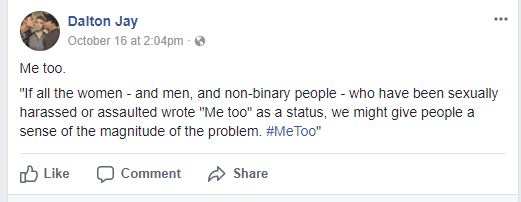#MeToo is sparking an eye-opening conversation about sexual assault victims and the stigma surrounding them
Victoria Plowman
Kicker
With trembling hands and a deep breath, Dalton Jay typed two simple words in a Facebook post: Me Too.
#MeToo is a movement of support between victims of sexual assault that began trending on social media last week. Ten years ago activist Tarana Burke started the movement, and actress Alyssa Milano revived it earlier this month.
Jay said he posted his #MeToo status in hopes of educating people that sexual assault can happen to anyone, no matter what gender they may be.

On a wintry night while staying with extended family, Jay faced the unimaginable at the tender age of 14.
“I was asleep, but someone had opened the door and woke me up,” said Jay. “I thought it was the dog and rolled over to go back to sleep, and the next thing I knew, someone was on top of me.”
“My body was frozen,” he said. “I couldn’t move, couldn’t scream – it was just darkness.”
He said that he was terrified of being called a liar if he told anyone.
“I felt like if I tried to tell anyone nobody would believe me because I’m a guy who was assaulted by another guy,” he said. “We live in a world where people assume that only females can be victims, but that’s so far from the truth.”
“It’s important for people to be able to speak out and look for support.”
Because of the fear that ate him alive for so long, he made the decision to post a status with the #MeToo hashtag.
“It’s important for people to be able to speak out and look for support,” he said.
“We should be able to let our voices be heard.”
Along with several high-profile sexual assault allegations in the media recently, including those against Hollywood film producer Harvey Weinstein and Canadian impresario Gilbert Rozon, many are finding the courage to come forward about their own traumas.
Laura King, a student at Memorial University in St. John’s, was sexually assaulted back in 2014 while at a friend’s cabin.
“I was afraid no one would believe me,” said King.
It’s a universal sentence that is heard too often, King said, and there’s no need of it. She says the #MeToo hastag is an outlet for victims who may also be scared to come forward.
“It took me months to finally tell someone about what happened to me, and those months were the most brutal of my life,” she said.
“Nobody should ever have to go through being afraid to speak out.”




Be the first to comment